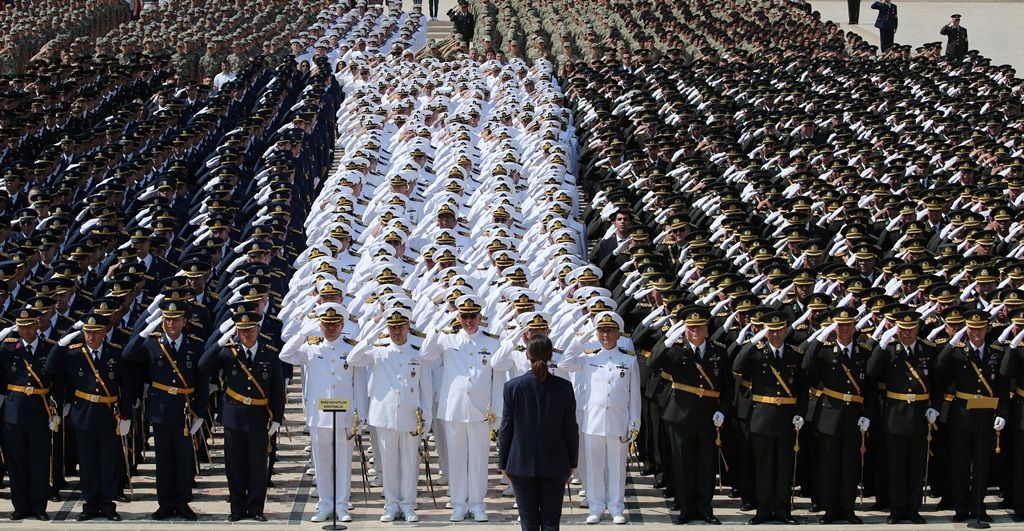The Road to Global Power: Turkey’s Overseas Military Bases

Turkey’s Global Power Aspirations
Before the 2018 presidential election, Erdoğan announced that the fundamental goal of his foreign policy would be to make Turkey a “leader state”. According to this vision, Turkey should become a global power and one of the “centres” of an emerging “multi-polar” international order before 2023, when the Republic of Turkey celebrates its centenary. By then, Turkey should also belong to the exclusive club of the 10 largest economies in the world. Not only would this emphasize its global power status but also enhance its material base for conducting an active foreign policy. The expansion of the system of overseas military bases is another element that serves the “leader state” vision. With them, Turkey is more capable of protecting its expanding interests.
Erdoğan’s concepts are the result of long-term changes in Turkey’s security policy that began in the 1980s. The changes were tied to the need to find responses to new challenges and threats, such as terrorism conducted by the Kurdistan Worker’s Party (PKK) and carried out from the territory of neighbouring countries or the destabilising effect of regional crises on Turkey. As a result, Turkish decision-makers who traditionally had defined security in narrow terms—limiting it to the question of territorial integrity—began to view the concept in wider terms. The culmination of this trend is represented well by Turkey’s current offensive and pre-emptive security doctrine, especially visible in its actions aimed at the PKK. Within this framework, Turkey declares it is ready to combat threats at their source, which includes acting outside its borders. Another manifestation of the changes is Turkey’s growing tendency to use force-projection with the aim to defend its own interests, which can be seen, for example, in Turkey’s stance towards the situation in the Eastern Mediterranean. The source of this lays primarily in the process of the consolidation of power in the hands of the current president (medium-term perspective) and the increase in Turkey’s economic and military power in recent decades (long-term perspective).
Turkey’s Overseas Military Bases
The Turkish bases are located on the territory of four countries— Somalia, Qatar, Iraq, and Syria—and in the so-called Turkish Republic of Northern Cyprus (TRNC). The largest one, in TRNC, hosts around 30,000 troops and is aimed at protecting the security of the quasistate—recognized only by Turkey—as well as influencing the Cyprus problem to protect the interests of both the Turkish Cypriots and Turkey itself as a guarantor state. The bases in Somalia (around 2,000 troops) and Qatar (eventually up to 3,000 soldiers) are instrumental in building and strengthening bilateral alliances and intensifying military cooperation, and thus gaining new markets for the Turkish arms industry, providing security to both countries and demonstrating the political will of Turkey’s authorities, as well as projecting power. The last two are of particular importance in the case of Qatar, embroiled in a diplomatic dispute with the Arab States. Turkey’s installations in Iraq and Syria, the size of which is hard to estimate, serve as forward-operating bases. They are located in a dozen places on both countries’ territories and are used mainly to fight the PKK, carry out reconnaissance and intelligence work, and support local partners as well as for unconventional warfare.
Though the bases have different characteristics, they all serve the basic objectives of Turkey’s foreign and security policy: strengthening the country’s international position, especially in the Middle East, underlining Turkey’s image as a global power, and securing its interests in areas regarded by Turkish decision-makers as zones of privileged interest. Therefore, the Turks have been considering an extension of the system of the overseas military bases. The most advanced plans include the creation of a naval base at the TRNC. According to Turkish media, the Naval Command has already submitted a proposal on this to the government. Turkey also seems interested in setting up a base on Suakin Island (Sudan), which would grant it direct access to the Red Sea. Also, Kuwait may be interested in hosting a Turkish military base since its leaders are distressed about the expansionist tendencies in the foreign policy of Saudi Arabia and could perceive such an installation as a way to strengthen their country’s security.
Conclusions and Prospects
The construction of overseas military bases forms part of the long-term transformation of Turkish foreign and security policy, making the continuation of the programme of expansion very likely. In the coming years, this programme will probably focus primarily on additional naval bases, in line with another recent trend to empower the Turkish Navy and increase its role in securing state interests. As a consequence, Turkey’s tendency to project power to demonstrate the political will of Turkish decision-makers is also likely to increase. It is even more probable when one takes into consideration that such actions are conducive to strengthening the image of Turkey as a power determined to defend its interests, which is especially important for Erdoğan as he seeks to maintain internal support to remain in power.
Yet, the plans to expand Turkey’s overseas military presence face numerous challenges that may delay their implementation. Currently, the most serious are the state’s economic problems. Although they have not yet had a negative impact on Turkey’s military potential, they may force politicians to reduce spending on defence over time (for example, the problems have already made it nearly impossible for the country to achieve its 2023 economic goals). Additional challenges stem from other international actors’ perception of Turkey’s actions, especially those in the Middle East. For now, the Turkish plans are fostered by the increased political polarisation of the region that has led some partners—for example, Kuwait and Qatar— to see Turkey as a potential guarantor of their security. Nonetheless, the experience of recent years, especially after the “Arab Spring,” shows that the Turkish actions related to hard power are generally assessed as unfavourable by Middle Eastern governments. Such criticism may even intensify together with problems between Turkey and its Western allies. Polls conducted in recent years have shown that Turkey had been more praised in the region when it was able to maintain good relations with both its Eastern and Western partners.
In the medium term, the base-extension programme can make Turkey a factual regional power—one that will have real potential to influence the political and security situation there. This may lead to an improvement in Turkey’s position in NATO, with the Allies possibly viewing it as capable of helping to stabilise the Middle East. The trend also may be supported by the strengthening of its navy, which potentially increases Turkey’s importance in minimising the effects of humanitarian and migration crises. Yet, for this scenario to become a reality, a few conditions have to be met. First, it will need a solution to the problems in relations between Turkey and the U.S. that hinder the functioning of NATO. Second, it will also require changes in Turkey’s foreign policy that would make the country a more predictable ally. Third, the development of a new model of Turkey’s role in NATO, which would solve the problem of the country’s growing assertiveness, will be essential. This is because the tendency of Turkish politicians to distance themselves from NATO actions—perceived by them as incompatible with Turkey’s interests (for example, the deterrence policy towards Russia)—in exchange for support for the Alliance in other directions will most probably increase as a result of the growth in Turkey’s capability for power projection, thanks to the expansion of its network of overseas military bases.



